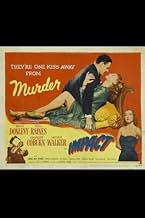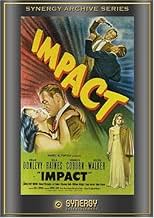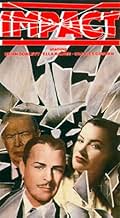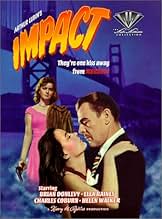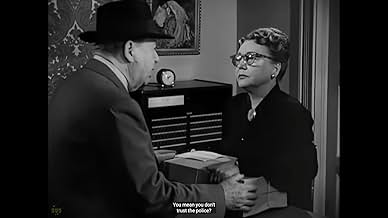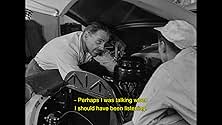VALUTAZIONE IMDb
7,0/10
5197
LA TUA VALUTAZIONE
Una moglie infedele trama con il suo amante per uccidere il marito, ma l'amante viene ucciso accidentalmente. Il marito rimane nascosto e lascia che la moglie venga accusata di cospirazione.Una moglie infedele trama con il suo amante per uccidere il marito, ma l'amante viene ucciso accidentalmente. Il marito rimane nascosto e lascia che la moglie venga accusata di cospirazione.Una moglie infedele trama con il suo amante per uccidere il marito, ma l'amante viene ucciso accidentalmente. Il marito rimane nascosto e lascia che la moglie venga accusata di cospirazione.
- Regia
- Sceneggiatura
- Star
Glen Vernon
- Ed
- (as Glenn Vernon)
Linda Leighton
- Telephone Operator
- (as Linda Johnson)
Jason Robards Sr.
- Judge
- (as Jason Robards)
Recensioni in evidenza
Although the final third gets in the way and is finally disappointing,it does not keep "impact" from being absorbing and entertaining.One of the rare film noirs -maybe the only one - which takes a look on the brighter side of the road:sandwiched between two very dark parts,the second one has Capra accents:the country town is some Shangri-la where time stood still ,with its very nice people ,the girl who owns a garage but of course does not know anything about mechanics(woman's lib supporters will cringe),the young father proud of his new-born son ,the Sunday service,the old lady cooking tasty little dishes.All of this is unusual in a film noir.Some might say that "shadow of a doubt"(1942) had already that ,but evil could enter this world,as the heroine 's uncle came to town.Here,the evil is elsewhere ,in San Francisco.Only in San Francisco.Or on the dark road where anything can happen:first part is effective,and shows some "Postman always rings twice" (1946) influence.
Successful businessman Walter Williams (Brian Donlevy) loves his pretty wife Irene (Helen Walker) more than anything. Little does he know she's plotting with her lover to kill him. During the murder attempt, Walter is hit hard on the head but lives. The other guy, however, is killed in a car crash and burned beyond recognition. Believed to have been the man killed in the crash, Walter decides not to come forward. Instead he goes to work as a mechanic in the garage of Marsha Peters (Ella Raines). When Irene is tried for his murder, Walter must decide whether or not to reveal he's still alive.
Brian Donlevy is pretty good. He's at his best when his character is angry or edgy. The sappy romantic stuff doesn't fit him well. Helen Walker is a particularly hissable villainess. Lovely Ella Raines is the good girl. There's no meat to the part but she does well with what she's given. Charles Coburn plays the detective out to get to the bottom of things. He's always fun. Arthur Lubin's direction in the first half is great film noir. I loved the scene where the lover tries to kill the husband. The whole thing was brilliantly executed. Then something happens and it's like a separate movie. The second half is much less like noir and more like a standard crime melodrama where a girl has to prove her guy is innocent of murder. If the entire picture had been like the first half, I'd say it was one of film noir's best. But it isn't. It's still an enjoyable movie with some good twists and turns.
Brian Donlevy is pretty good. He's at his best when his character is angry or edgy. The sappy romantic stuff doesn't fit him well. Helen Walker is a particularly hissable villainess. Lovely Ella Raines is the good girl. There's no meat to the part but she does well with what she's given. Charles Coburn plays the detective out to get to the bottom of things. He's always fun. Arthur Lubin's direction in the first half is great film noir. I loved the scene where the lover tries to kill the husband. The whole thing was brilliantly executed. Then something happens and it's like a separate movie. The second half is much less like noir and more like a standard crime melodrama where a girl has to prove her guy is innocent of murder. If the entire picture had been like the first half, I'd say it was one of film noir's best. But it isn't. It's still an enjoyable movie with some good twists and turns.
Impact (1949)
An underrated, understated, nicely stylized, and tightly constructed film noir. The director, Arthur Lubin, is a B-movie figure (with a lot of films to his name), and I'm going to guess just from this one that there are others in the history that are very good. This has been running the noir circuits for a long time, and is especially noteworthy. The photography by Ernst Laszlo is especially helpful, and with some smart editing it makes for a visually terrific movie.
But the acting is great, too. Yes, everyone fills some familiar roles for this kind of upper crust murder and cover up, but it's tightly done, convincing throughout. Brian Donlevy is a fabulous (and typically Donlevy) industrialist who has to take on a second identity for part of the film, and it's a great surprise. The two lead women, both the same age (29), and both with short careers, play two very different types of women that the industrialist bounces between. The first, Helen Walker, is the clever, rich wife. The second, Ella Rains, is the homespun girl who wants only for everything to turn out okay. (Rains was a Howard Hawks discovery, and with her classic clean cut looks, even made it on the cover of Life Magazine twice, on February 28, 1944 and August 11, 1947.)
One other character whose performance is sterling is Charles Coburn, playing the aging detective. A lesser role, but from a remarkable actress, is the maid, played by Anna May Wong (who got stereotyped in the movies but who is now increasingly appreciated as the first major Chinese-American actress).
Yes, this is a great film for film buffs, and a really good story for everyone. Make sure you have a clean DVD transfer to appreciate the photography (see http://www.dvdbeaver.com/film/DVDCompare10/impact_.htm for some info on that kind of thing).
An underrated, understated, nicely stylized, and tightly constructed film noir. The director, Arthur Lubin, is a B-movie figure (with a lot of films to his name), and I'm going to guess just from this one that there are others in the history that are very good. This has been running the noir circuits for a long time, and is especially noteworthy. The photography by Ernst Laszlo is especially helpful, and with some smart editing it makes for a visually terrific movie.
But the acting is great, too. Yes, everyone fills some familiar roles for this kind of upper crust murder and cover up, but it's tightly done, convincing throughout. Brian Donlevy is a fabulous (and typically Donlevy) industrialist who has to take on a second identity for part of the film, and it's a great surprise. The two lead women, both the same age (29), and both with short careers, play two very different types of women that the industrialist bounces between. The first, Helen Walker, is the clever, rich wife. The second, Ella Rains, is the homespun girl who wants only for everything to turn out okay. (Rains was a Howard Hawks discovery, and with her classic clean cut looks, even made it on the cover of Life Magazine twice, on February 28, 1944 and August 11, 1947.)
One other character whose performance is sterling is Charles Coburn, playing the aging detective. A lesser role, but from a remarkable actress, is the maid, played by Anna May Wong (who got stereotyped in the movies but who is now increasingly appreciated as the first major Chinese-American actress).
Yes, this is a great film for film buffs, and a really good story for everyone. Make sure you have a clean DVD transfer to appreciate the photography (see http://www.dvdbeaver.com/film/DVDCompare10/impact_.htm for some info on that kind of thing).
Too bad the movie's a disappointing crime thriller after a promising start. Brian Donlevy plays a high-powered corporate executive with a lavish apartment and a silken wife (Helen Walker). Trouble is the doe-eyed Walker has teamed up with a low-class lover (Tony Barrett) to plot Donlevy's murder. When that fails, Donlevy finds himself stranded in a small Idaho town where he settles in with new girl friend Ella Raines. However, police are still trying to unravel what happened at failed murder site, so an unresolved cloud hangs over both Donlevy and wife Walker.
Strong opening that nicely sets up the melodrama and Donlevy's betrayal. Middle part is unusual for crime drama since it celebrates virtues of small town life. Yet, it does so fairly effectively, such that even a hard-charging executive like Donlevy would find welcome escape from city life and a faithless wife. Last third, however, settles into routine suspenser as Raines seeks evidence to clear Donlevy.
Though movie contains noirish elements, particularly spider-woman Walker and destiny-crossed Donlevy, director Lubin films in flat, uninspired fashion that adds nothing to the script. In fact, his approach tends to drain excitement from those parts that should have impact. For example, the business around the doomed car needs a few emotional close-ups to emphasize the cat-and-mouse stalking going on. Instead, Lubin's camera remains at an impersonal distance as if it's a family outing being filmed. The movie's entire texture appears better suited to a police docu-drama than that of a man menaced by unseen forces.
Casting too, amounts to a problem. Donlevy's a fine character actor who could bring off authority figures with real conviction. As a high-powered executive, he's excellent; as a romantic figure, he's about 10 years too old and not much good at softer emotions. Then too, having the comely and much younger Ella Raines quickly fall for him is something of a stretch. A bigger problem lies in framing Walker's lover as something of a low-life, without the charm or polish that would naturally attract a high-class woman of her social standing. The script would have been wise to imply that Walker is just using him to get rid of her husband. Just as unpersuasive is the casting of a geriatric (72 year-old) Charles Coburn as a cop, even if he does manage some finesse. All in all, the oddball casting just doesn't work.
An exception is Helen Walker who's perfectly suited to her role as the devious woman. Watch her array of expressions as the cops close in. Her career was unfortunately slowed down by a debilitating accident and she died much too early . Though largely forgotten today because of her few credits, once you see her, you don't forget her with her "upside down" eyes, statuesque bearing, and unforced beauty. She's unforgettable as Tyrone Power's scheming nemesis in Nightmare Alley and could do comedy equally well, as in the hilarious Murder, He Says (1945). In my little book, she could easily qualify as an actress with a cult following.
Too bad that an Anthony Mann, Robert Siodmak, or Andre deToth didn't get hold of the material before the pedestrian Lubin. The premise is prime material for noir treatment, and with more astute casting, might have become a classic.
Strong opening that nicely sets up the melodrama and Donlevy's betrayal. Middle part is unusual for crime drama since it celebrates virtues of small town life. Yet, it does so fairly effectively, such that even a hard-charging executive like Donlevy would find welcome escape from city life and a faithless wife. Last third, however, settles into routine suspenser as Raines seeks evidence to clear Donlevy.
Though movie contains noirish elements, particularly spider-woman Walker and destiny-crossed Donlevy, director Lubin films in flat, uninspired fashion that adds nothing to the script. In fact, his approach tends to drain excitement from those parts that should have impact. For example, the business around the doomed car needs a few emotional close-ups to emphasize the cat-and-mouse stalking going on. Instead, Lubin's camera remains at an impersonal distance as if it's a family outing being filmed. The movie's entire texture appears better suited to a police docu-drama than that of a man menaced by unseen forces.
Casting too, amounts to a problem. Donlevy's a fine character actor who could bring off authority figures with real conviction. As a high-powered executive, he's excellent; as a romantic figure, he's about 10 years too old and not much good at softer emotions. Then too, having the comely and much younger Ella Raines quickly fall for him is something of a stretch. A bigger problem lies in framing Walker's lover as something of a low-life, without the charm or polish that would naturally attract a high-class woman of her social standing. The script would have been wise to imply that Walker is just using him to get rid of her husband. Just as unpersuasive is the casting of a geriatric (72 year-old) Charles Coburn as a cop, even if he does manage some finesse. All in all, the oddball casting just doesn't work.
An exception is Helen Walker who's perfectly suited to her role as the devious woman. Watch her array of expressions as the cops close in. Her career was unfortunately slowed down by a debilitating accident and she died much too early . Though largely forgotten today because of her few credits, once you see her, you don't forget her with her "upside down" eyes, statuesque bearing, and unforced beauty. She's unforgettable as Tyrone Power's scheming nemesis in Nightmare Alley and could do comedy equally well, as in the hilarious Murder, He Says (1945). In my little book, she could easily qualify as an actress with a cult following.
Too bad that an Anthony Mann, Robert Siodmak, or Andre deToth didn't get hold of the material before the pedestrian Lubin. The premise is prime material for noir treatment, and with more astute casting, might have become a classic.
This film noir has three distinct movements. Brian Donlevy proves masterful at playing a high-powered executive, self-satisfied and in control. As in any good drama, his secure world is assaulted and turned upside down The film portrays his characters descent, loss of faith and subsequent redemption. Donlevy handles each of the stages well.
Helen Walker is brilliant as Donlevy's wife. Her ability to portray a duplicitous and homicidal spouse is immaculate in it's delivery.
I found great pleasure in watching the legal machinations and the ambivalence of the justice system.
More then anything, and I've commented on this in other film noir reviews, I enjoyed the street scenes of San Francisco a half century ago. Sometimes I think I'd be just as happy to forgo plot in favor of travelogue Also, Larkspur (whether it is in California or Idaho,) just seems like a fine little town the likes of which we now pine for. The volunteer fire department scene was reflective of my sense of small town values.
All in all, an absorbing,nostalgic and thought provoking piece of film art.
Helen Walker is brilliant as Donlevy's wife. Her ability to portray a duplicitous and homicidal spouse is immaculate in it's delivery.
I found great pleasure in watching the legal machinations and the ambivalence of the justice system.
More then anything, and I've commented on this in other film noir reviews, I enjoyed the street scenes of San Francisco a half century ago. Sometimes I think I'd be just as happy to forgo plot in favor of travelogue Also, Larkspur (whether it is in California or Idaho,) just seems like a fine little town the likes of which we now pine for. The volunteer fire department scene was reflective of my sense of small town values.
All in all, an absorbing,nostalgic and thought provoking piece of film art.
Lo sapevi?
- QuizThe building that served as the exterior of Sue Lin's apartment is 834 Washington St., San Francisco, CA. It still stands as of this writing (04/2019) almost completely intact. There is a business on the ground floor, but the three floors above it remain, and nearly all the adornments remain. (It can be viewed on Google maps, street view.)
- BlooperThe end credits list the name of the character played by Mae Marsh as "Mrs. Peters"; Marsh played the mother of the gas station owner. The only time the mother's name is mentioned in the film is when Walter Williams first comes to the house for supper, and he calls her "Mrs. King". Marsha Peters (the gas station owner) and her mother would not have had the same last name, since Marsha explains when she first meets Walter that her husband was killed in World War II.
When this movie was made, and in the small town where this character lived, a woman would not have kept her maiden name when marrying or returned to it after being widowed. She would have remained Mrs. Peters unless she remarried.
- Citazioni
Lt. Tom Quincy: Are you Ah Sing? Understand? You understandee English?
Ah Sing: [nodding and speaking in perfect English] Also French, Italian, and Hebrew.
- ConnessioniEdited into The Green Fog (2017)
I più visti
Accedi per valutare e creare un elenco di titoli salvati per ottenere consigli personalizzati
- How long is Impact?Powered by Alexa
Dettagli
Botteghino
- Budget
- 900.000 USD (previsto)
- Tempo di esecuzione1 ora 51 minuti
- Colore
- Proporzioni
- 1.33 : 1
Contribuisci a questa pagina
Suggerisci una modifica o aggiungi i contenuti mancanti

Divario superiore
By what name was Ho ritrovato la vita (1949) officially released in India in English?
Rispondi


